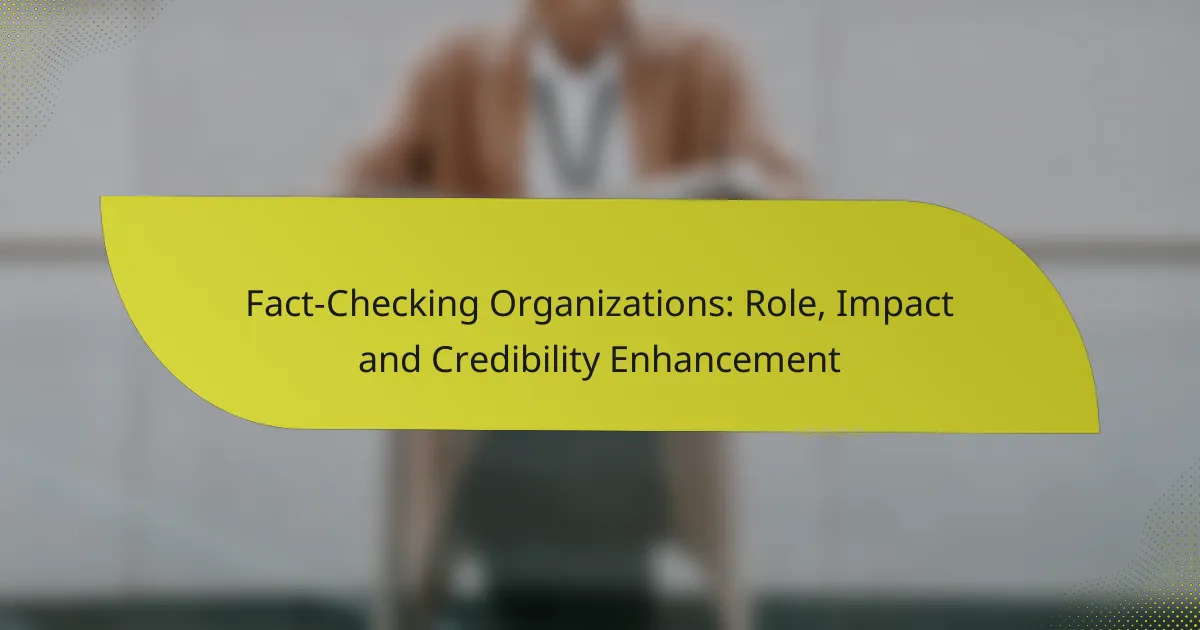Fact-checking organizations are essential in the fight against misinformation, as they rigorously verify claims and provide accurate information to the public. By enhancing credibility and fostering a more informed society, these organizations significantly influence media practices and promote accountability across various platforms.
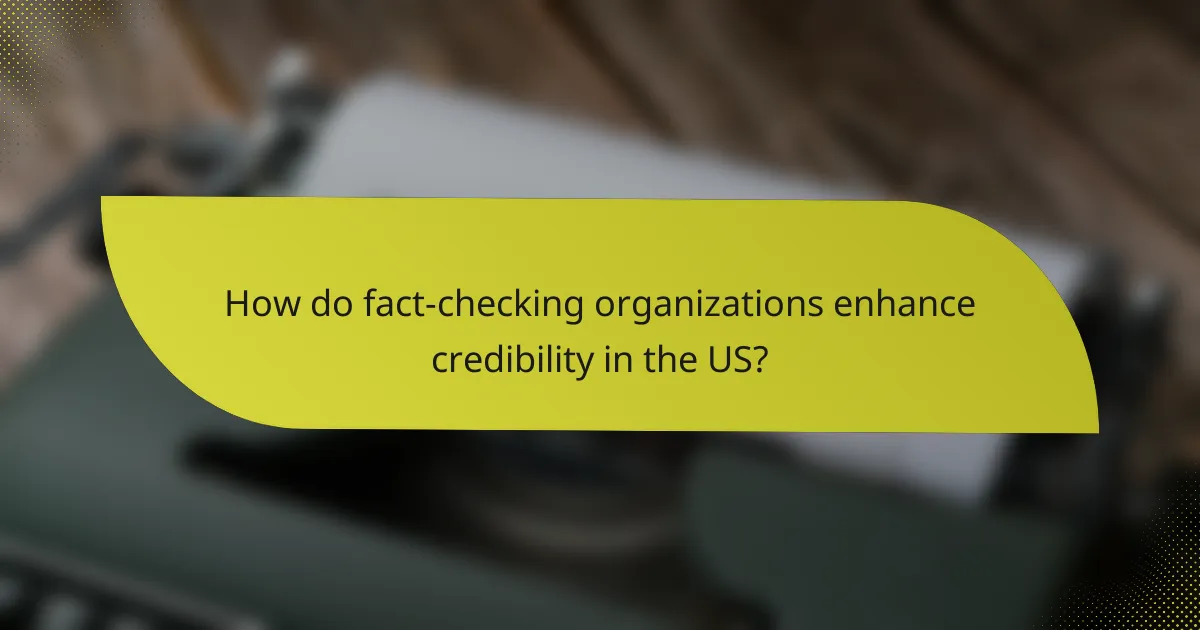
How do fact-checking organizations enhance credibility in the US?
Fact-checking organizations enhance credibility in the US by verifying claims and providing accurate information to the public. Their rigorous processes help combat misinformation, fostering a more informed society.
Verification of information
Fact-checking organizations systematically evaluate the accuracy of statements made by public figures, media outlets, and online sources. They employ a range of methods, including sourcing primary documents, consulting experts, and cross-referencing data. This thorough verification process ensures that only credible information is disseminated to the public.
For instance, organizations like PolitiFact and FactCheck.org assess claims on a scale of truthfulness, which helps readers quickly understand the reliability of the information presented. This not only clarifies facts but also highlights misleading statements.
Promotion of transparency
By openly sharing their methodologies and sources, fact-checking organizations promote transparency in information verification. This openness allows the public to see how conclusions are drawn and encourages accountability among those making claims. Transparency builds confidence in the fact-checking process itself.
Many organizations publish detailed reports on their findings, including the evidence used for verification. This practice not only informs the audience but also invites scrutiny, which can lead to improved standards and practices within the field.
Public trust building
Fact-checking organizations play a crucial role in building public trust by consistently delivering accurate information. As they become recognized for their reliability, they help reduce skepticism towards media and political statements. This trust is essential for a functioning democracy, where informed citizens can make educated decisions.
Engagement with the community through outreach programs and educational initiatives further strengthens this trust. By teaching individuals how to critically evaluate information, these organizations empower the public to discern fact from fiction, fostering a more informed electorate.
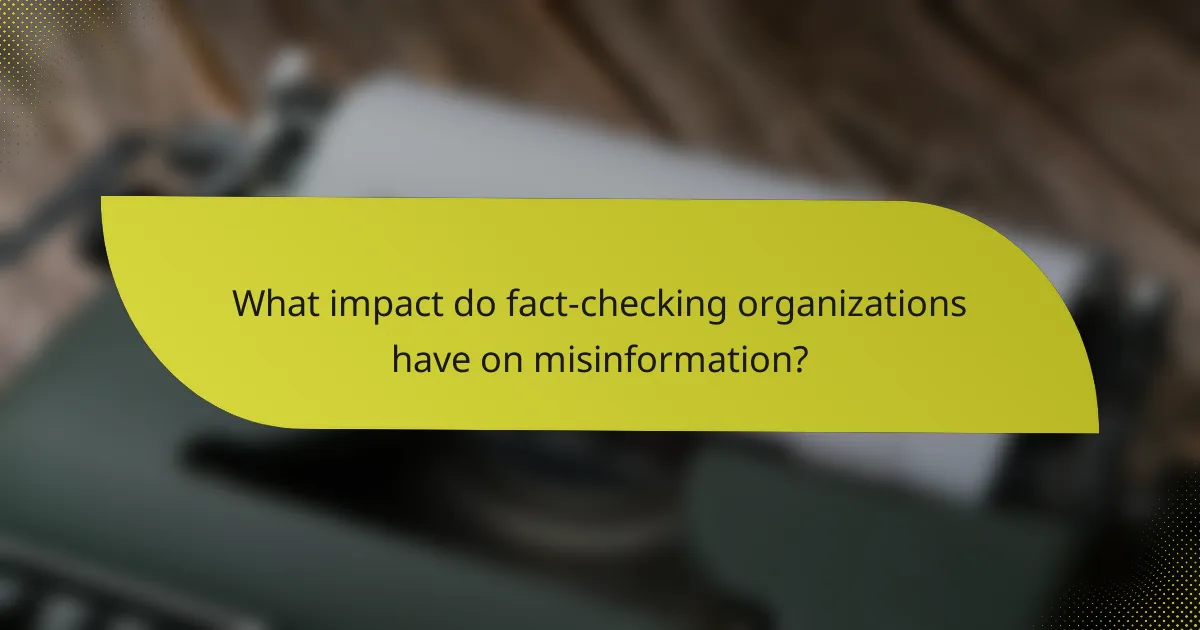
What impact do fact-checking organizations have on misinformation?
Fact-checking organizations play a crucial role in combating misinformation by verifying claims and providing accurate information. Their impact is evident in reducing the spread of false narratives, influencing media reporting practices, and engaging with social media platforms to promote accountability.
Reduction of false narratives
Fact-checking organizations significantly reduce false narratives by scrutinizing claims made in public discourse. They assess the accuracy of statements made by politicians, media figures, and other influential sources, often debunking misleading information before it spreads widely.
For instance, during election cycles, fact-checkers frequently evaluate campaign statements, helping voters make informed decisions. This proactive approach can diminish the prevalence of false claims, leading to a more informed public.
Influence on media reporting
Fact-checking organizations influence media reporting by setting standards for accuracy and accountability. Many news outlets now incorporate fact-checking into their reporting processes, often citing these organizations to bolster their credibility.
As a result, journalists are more likely to verify information before publication, which enhances the overall quality of news coverage. This shift encourages a culture of responsibility among media outlets, ultimately benefiting the audience.
Engagement with social media platforms
Fact-checking organizations actively engage with social media platforms to combat misinformation online. They collaborate with these platforms to flag false information and provide context for misleading posts, which helps users discern credible content.
For example, partnerships with platforms like Facebook and Twitter have led to the implementation of warning labels on disputed content. This engagement not only raises awareness but also encourages users to think critically about the information they encounter.
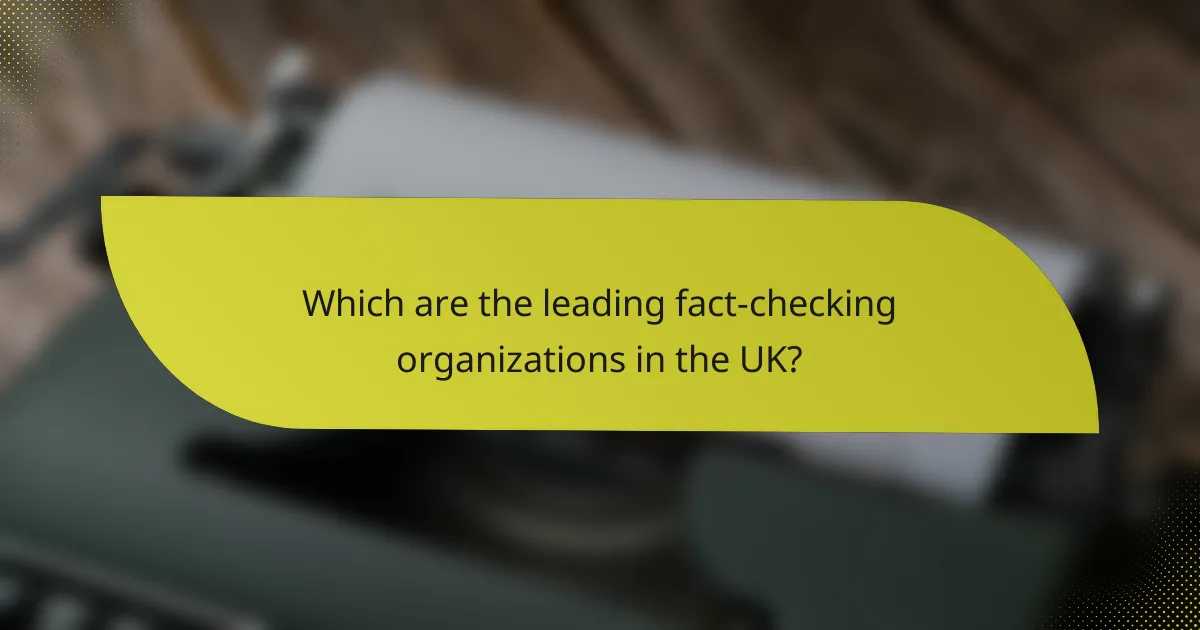
Which are the leading fact-checking organizations in the UK?
The leading fact-checking organizations in the UK include Full Fact, FactCheck.org, and Snopes. These organizations play a crucial role in verifying information, combating misinformation, and enhancing public trust in media and information sources.
Full Fact
Full Fact is an independent fact-checking charity based in the UK that focuses on verifying claims made by politicians, the media, and other public figures. It uses a rigorous methodology to assess the accuracy of statements and provides evidence-based conclusions.
One of Full Fact’s key features is its commitment to transparency, allowing users to see the sources and reasoning behind each fact-check. This enhances credibility and helps the public understand complex issues.
FactCheck.org
FactCheck.org is a non-profit organization that monitors the factual accuracy of statements made by political figures in the United States. While it primarily focuses on American politics, its methodologies and findings can be insightful for UK audiences interested in comparative fact-checking practices.
The organization employs a team of researchers and journalists who analyze claims, providing detailed reports and context. This thorough approach helps users discern the truth behind political rhetoric.
Snopes
Snopes is one of the oldest and most well-known fact-checking websites, originally focused on debunking urban legends and myths. It has since expanded to cover a wide range of topics, including current events and viral misinformation.
Snopes employs a straightforward rating system to indicate the accuracy of claims, which helps users quickly assess the reliability of information. Its extensive database is a valuable resource for anyone looking to verify dubious claims encountered online.
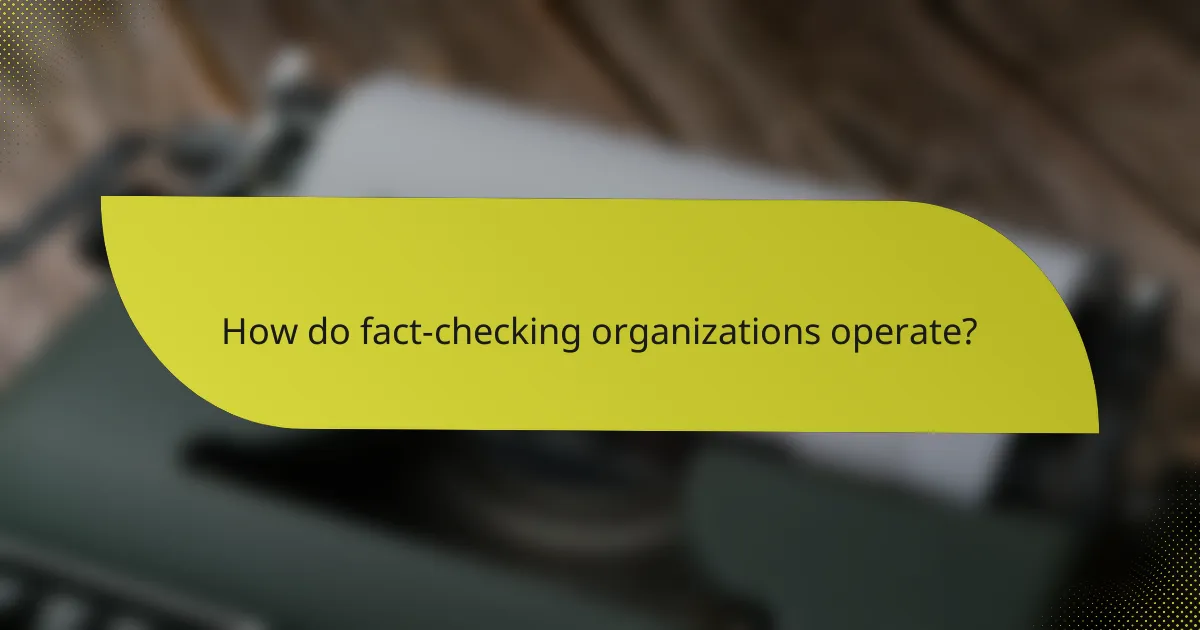
How do fact-checking organizations operate?
Fact-checking organizations operate by verifying claims made in public discourse, particularly in media and politics. They employ systematic methods to assess the accuracy of information, providing clarity and accountability in the information landscape.
Research and analysis
Fact-checkers begin their work with thorough research and analysis of the claims being investigated. This involves gathering evidence from credible sources, such as academic studies, official documents, and expert opinions. The goal is to establish a factual basis for the claim, often requiring cross-referencing multiple sources.
For example, if a politician claims that unemployment has decreased by a specific percentage, fact-checkers will look at labor statistics, government reports, and economic analyses to confirm or refute this assertion. This rigorous approach helps ensure that the conclusions drawn are well-supported and reliable.
Collaboration with journalists
Fact-checking organizations frequently collaborate with journalists to enhance the quality of reporting. By providing journalists with verified information, they contribute to more accurate news coverage. This partnership is crucial, especially during high-stakes events like elections or public health crises.
Additionally, some fact-checkers work directly with media outlets to develop fact-checking segments or articles, ensuring that the public receives timely and accurate information. This collaboration fosters a culture of accountability in journalism and helps combat misinformation.
Use of technology
Technology plays a vital role in the operations of fact-checking organizations. Many utilize advanced tools and software to streamline the research process, such as databases for tracking claims and automated systems for monitoring social media. These technologies can significantly reduce the time needed to verify information.
Moreover, some organizations employ machine learning algorithms to identify trending misinformation, allowing them to prioritize their efforts effectively. By leveraging technology, fact-checkers can enhance their efficiency and reach, making a broader impact in the fight against false information.
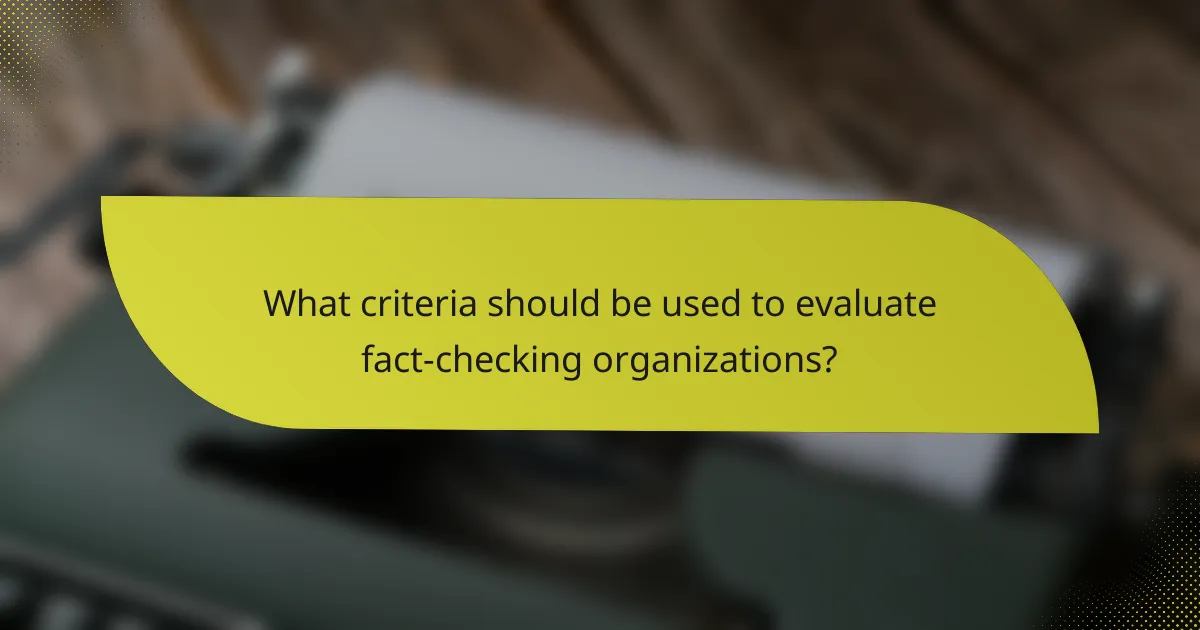
What criteria should be used to evaluate fact-checking organizations?
To evaluate fact-checking organizations, consider their transparency of methodology, independence and impartiality, and track record of accuracy. These criteria help determine the reliability and credibility of the information they provide.
Transparency of methodology
Transparency in methodology refers to how clearly a fact-checking organization outlines its processes for verifying information. Organizations should provide detailed descriptions of their fact-checking procedures, including the sources they consult and the criteria they use to assess claims.
For example, a reputable organization might publish a guide on its website explaining how it evaluates the credibility of sources or the steps taken to reach a conclusion. This openness allows users to understand the basis of the fact-checks and fosters trust.
Independence and impartiality
Independence and impartiality are crucial for maintaining credibility in fact-checking. Organizations should operate free from political, financial, or ideological influences that could skew their assessments. This means they should not have affiliations with partisan groups or be funded by entities that may have vested interests in the outcomes of their checks.
To assess this criterion, look for organizations that disclose their funding sources and governance structures. An independent fact-checking organization is more likely to provide unbiased evaluations of claims.
Track record of accuracy
A strong track record of accuracy is essential for any fact-checking organization. This involves consistently producing correct assessments over time and being transparent about any errors made. Organizations should have mechanisms in place for correcting mistakes and updating their findings as new information becomes available.
To evaluate accuracy, consider looking for third-party assessments or reviews of the organization’s work. Additionally, organizations that publish their accuracy rates or have received recognition from reputable bodies can be seen as more trustworthy.
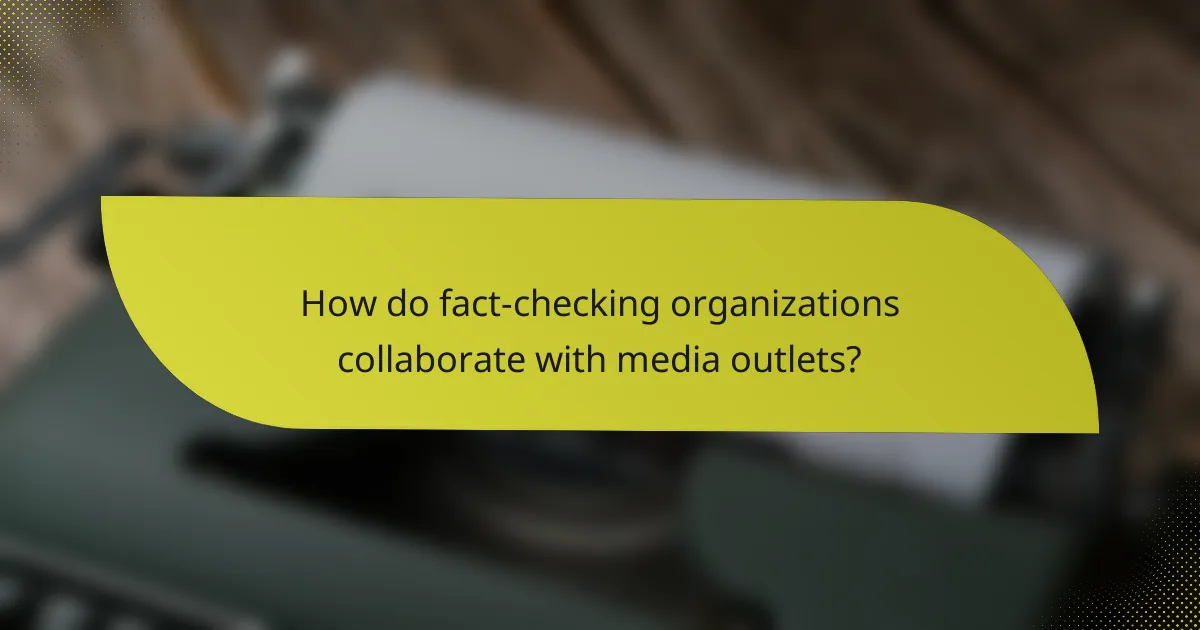
How do fact-checking organizations collaborate with media outlets?
Fact-checking organizations work closely with media outlets to enhance the accuracy of news reporting. They provide resources, expertise, and verification services that help journalists ensure the credibility of their information.
Partnerships for reporting
Fact-checking organizations often form partnerships with media outlets to facilitate accurate reporting. These collaborations can involve sharing data, resources, and methodologies that improve the overall quality of news content. For example, a fact-checking group might assist a news agency in verifying claims made during political debates or public statements.
Such partnerships can take various forms, including joint investigations, co-publishing fact-checks, or providing exclusive access to fact-checking tools. This synergy not only bolsters the credibility of the media outlet but also enhances public trust in the information being disseminated.
Training for journalists
Training programs offered by fact-checking organizations equip journalists with essential skills for verifying information. These programs often cover techniques for assessing sources, evaluating evidence, and identifying misinformation. Workshops and online courses can be tailored to the specific needs of journalists, focusing on relevant topics such as social media verification or data analysis.
By participating in these training sessions, journalists can improve their fact-checking abilities, leading to more accurate reporting. This ongoing education is crucial in an era where misinformation spreads rapidly, ensuring that media professionals remain adept at discerning fact from fiction.
